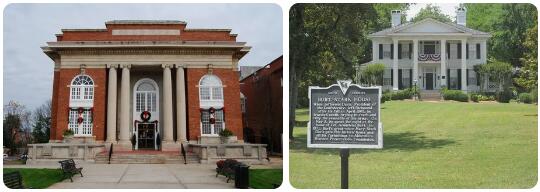
Abbeville County, South Carolina is a small, rural county located in the Upstate region of the state. It is bordered by Greenwood County to the north, Laurens County to the east, Anderson County to the south and Georgia to the west. The population of Abbeville County was estimated at 26,922 in 2019.
The county seat is Abbeville and it is home to several small towns including Antreville, Calhoun Falls, Due West and Donalds. Abbeville County is known for its rolling hills and beautiful scenery. The area is full of old-growth forests and plenty of lakes for fishing and boating. The area also boasts several historic sites including Old 96 District State Park which features a replica of an 18th century trading post as well as a few original log cabins from that period.
The economy in Abbeville County is largely based on agriculture with corn, wheat and soybeans being among the top crops grown in this area. There are also several manufacturing facilities located in the county providing jobs for locals. Tourism has become increasingly popular in recent years due to its proximity to several major cities such as Atlanta, Charlotte and Greenville.
Education opportunities are abundant in Abbeville County with seven public school districts serving students from Kindergarten through 12th grade as well as three technical colleges offering associates degrees or certificate programs for those looking for more specialized training or education beyond high school level courses. Additionally, there are two four-year universities located nearby: Erskine College located just outside Due West and Presbyterian College located about 30 minutes away from Abbeville City limits.
Abbeville County also offers plenty of recreational activities for residents including golf courses, hiking trails, parks and campgrounds along with numerous festivals throughout the year such as Calhoun Falls Festival held annually every May which includes live music, carnival rides and fireworks displays on Saturday night after dark!
In addition to all these amenities available within Abbeville County itself, one can also take day trips into neighboring counties or even further out into South Carolina’s larger cities like Columbia or Charleston where there’s plenty more cultural attractions! Overall Abbeville county provides a great quality of life with its friendly people combined with an abundance of outdoor activities making it a great place to live.
History of Abbeville County, South Carolina
Abbeville County, South Carolina has a long and rich history that dates back to the colonial era. The county was formed in 1785 when the South Carolina General Assembly split the Ninety-Six District into three separate counties: Edgefield, Abbeville, and Laurens. Abbeville was named after the French town of Abbeville, which had been founded by Huguenots fleeing religious persecution in France.
The first settlers of Abbeville were mostly Scots-Irish immigrants who arrived in the late 1700s. These settlers established a thriving agricultural economy based on cotton and tobacco production. Many of these early settlers also built grist mills and sawmills along the Saluda River to help support their farming endeavors. In addition to farming, Abbeville County also became a major center for iron manufacturing in the 1800s as well as a hub for railroad construction and transportation.
During the Civil War, Abbeville County was home to many Confederate soldiers who fought at nearby battles such as Gettysburg and Chickamauga Creek. After the war ended, former slaves moved into Abbeville County from other parts of South Carolina to take advantage of newly available economic opportunities. This influx of African Americans caused tension between whites and blacks that lasted well into the 20th century.
In spite of this tension, economic progress continued in Abbeville throughout much of its history. During World War II, several large military bases were built near present-day Greenwood that provided employment opportunities for many residents of Abbeville County. In addition to military bases, several textile mills opened up during this time period that helped fuel further growth in the county’s economy.
Today, much of Abbeville’s economy is still based on agriculture with cotton being one of its main crops along with soybeans and corn. The county is also known for its thriving tourism industry which includes attractions like Calhoun Falls State Park and John C Calhoun’s plantation home – Fort Hill – which are both located near the city of Calhoun Falls in western Abbeville County.
In recent years, there has been an effort to preserve some of Abbeville’s historical sites including several historic churches such as Old Long Cane Presbyterian Church (1790) and St John’s Episcopal Church (1830). In addition to preserving historical sites, there has also been an effort to improve educational offerings within the county by establishing new elementary schools throughout rural areas like Lowndesville and Due West as well as expanding existing universities like Presbyterian College (founded 1880).
Overall, despite some difficult times throughout its history, today’s citizens of Abbevillle County can take pride in their rich heritage while looking forward to continued progress into future.